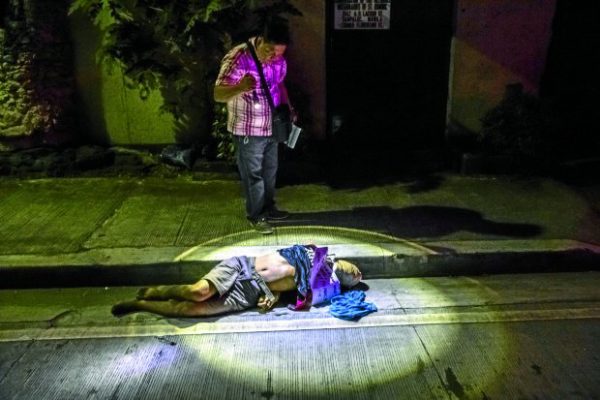Duterte’s EJK supporters violate US immigration laws
December 30, 2016 · By Rodel Rodis for globalnation.inquirer.netu

INQUIRER FILE
From December 6 through December 14, 2016, the New York Times published four major articles on Philippine Pres. Rodrigo Duterte’s brutal extrajudicial killings of drug suspects, now averaging about 44 killed a day. In “They are slaughtering us!” (December 7, 2016), New York Times’ news photographer Daniel Berehulak expressed shock at the scale of the killings, showing stark photos of 57 murder victims at 41 sites in the 35 days he spent in Manila.
“I witnessed bloody scenes just about everywhere imaginable — on the sidewalk, on train tracks, in front of a girls’ school, outside 7-Eleven stores and a McDonald’s restaurant, across bedroom mattresses and living-room sofas. I watched as a woman in red peeked at one of those grisly sites through fingers held over her eyes, at once trying to protect herself and permit herself one last glance at a man killed in the middle of a busy road.,” Berehulak wrote.
“I have worked in 60 countries, covered wars in Iraq and Afghanistan, and spent much of 2014 living inside West Africa’s Ebola zone, a place gripped by fear and death. What I experienced in the Philippines felt like a new level of ruthlessness: police officers’ summarily shooting anyone suspected of dealing or even using drugs, vigilantes’ taking seriously Mr. Duterte’s call to “slaughter them all,” the news photographer added.
Duterte said in October, “You can expect 20,000 or 30,000 more.”
Duterte used to do it personally
In the most recent article on the subject the New York Times’ Russell Goldman reported that Duterte personally boasted to business leaders in Manila on December 13 that “as mayor of Davao, he had patrolled the city’s streets by motorcycle looking for suspected criminals to kill.”
“In Davao, I used to do it personally — just to show to the guys that if I can do it, why can’t you?” Duterte said. Goldman wrote that “Mr. Duterte told business leaders at a meeting in Manila, explaining how he goaded police officers to gun down suspects.
“And I’d go around in Davao with a motorcycle, with a big bike around, and I would just patrol the streets, looking for trouble also,” he said, “I was really looking for a confrontation, so I could kill.”
It will be recalled that just before assuming the presidency on June 30, 2016, Duterte announced at a victory rally in Davao City, which was televised nationally, that Filipinos should take it upon themselves to kill those involved with drugs. (“Kill drug dealers and I’ll give you a medal, says Philippines president”, The Guardian, June 5, 2016).
“Please feel free to call us, the police, or do it yourself if you have the gun,” he said, offering a reward to anyone who complied. Duterte has also assured police and the military that he will take responsibility for extrajudicial killings and protect anyone who assassinates suspects from being held criminally responsible.”
Among the estimated millions of readers of the New York Times, which include those who read the Times’ syndicated articles in local newspapers, are employees of the US Department of Homeland Security (DHS) who are tasked with enforcing US immigration laws.
These DHS officials may now inquire of Filipinos visiting the US as tourists or even those applying for permanent residence or for naturalization if they approve of Duterte’s extrajudicial killings as part of his war against drugs and if they were involved in or participated in “any way in the killings.”
Extrajudicial killings may not be prosecuted in the Philippines under Duterte – as proven by the jail cell cold-blooded execution of Leyte Mayor Rolando Espinosa by 24 police officers on November 3 — but they are crimes in the United States and supporting their practice in the Philippines may have severe consequences for Duterte’s supporters in the United States.
Anti-Atrocity Alien Deportation Act
U.S. Immigration and Nationality Act Section 212 lists the “classes of aliens ineligible to receive visas and ineligible for admission” to the United States. Included under subsection E are “participants in Nazi persecutions, genocide or the commission of any act of torture or extrajudicial killing.”
Under this subsection E is: “iii) COMMISSION OF ACTS OF TORTURE OR EXTRAJUDICIAL KILLINGS- Any alien who, outside the United States, has committed, ordered, incited, assisted, or otherwise participated in the commission of– (I) any act of torture, as defined in section 2340 of title 18, United States Code; or (II) under color of law of any foreign nation, any extrajudicial killing, as defined in section 3(a) of the Torture Victim Protection Act of 1991 (28 U.S.C. 1350 note), is inadmissible.”
This new and expanded definition of “extrajudicial killing” became law in 2004 under Title XII Anti-Atrocity Alien Deportation Act of 2004.






